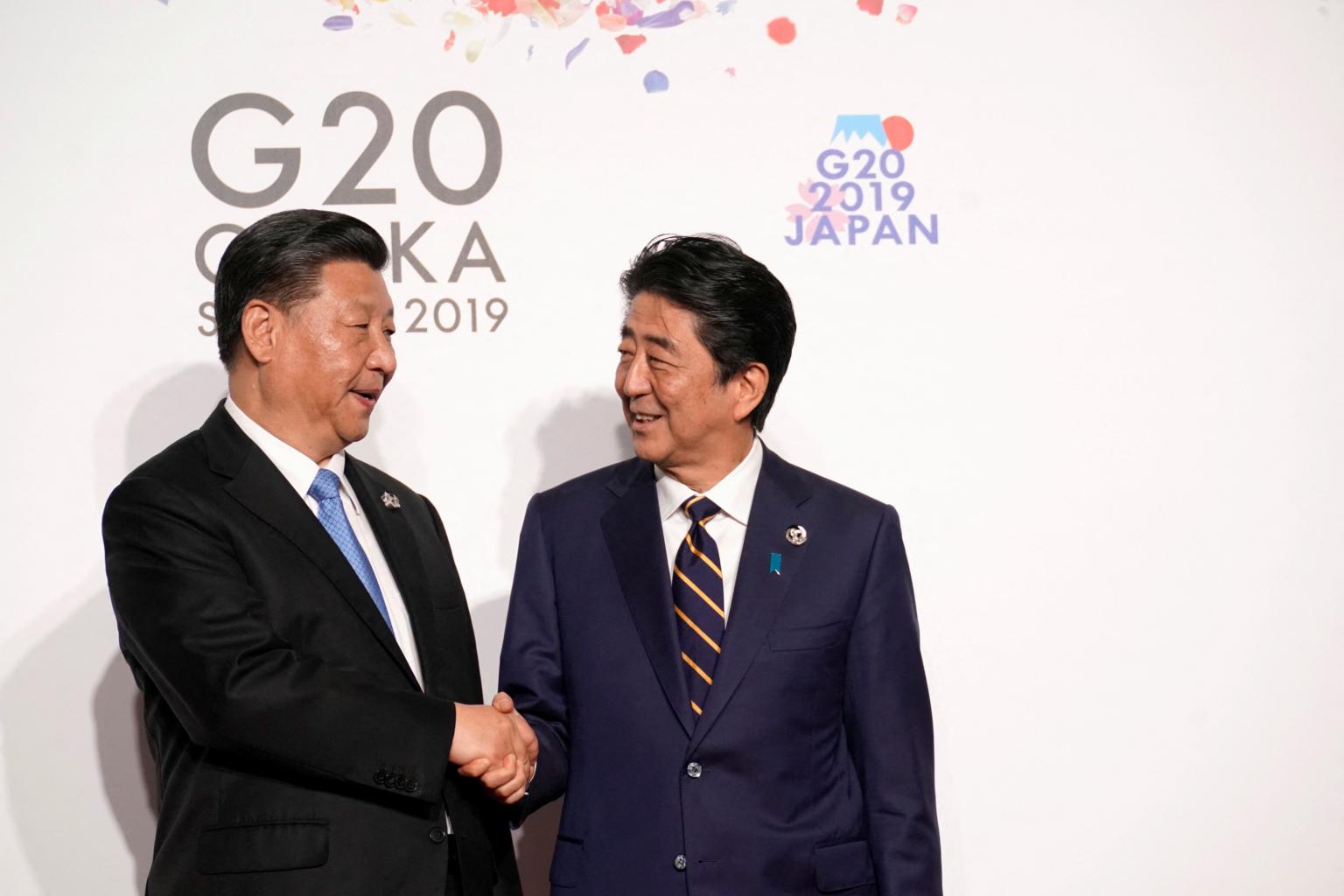Reactions in China to Shinzo Abe's death underscore his complex legacy there
Sign up now: Get insights on Asia's fast-moving developments

While Chinese President Xi Jinping expressed deep condolences over Mr Abe's death, netizens have reacted differently.
PHOTO: REUTERS
BEIJING - Chinese President Xi Jinping on Saturday (July 9) expressed his deep regret to Japanese Prime Minister Fumio Kishida over the death of Japan's former premier Shinzo Abe.
"On behalf of the Chinese government and the Chinese people, and in his own name, Xi Jinping expressed deep condolences over the untimely death of former prime minister Shinzo Abe, and condolences to his relatives," said state news agency Xinhua.
"I deeply regret his sudden passing," Mr Xi was quoted as saying, noting Mr Abe's efforts to improve China-Japan ties during his term in office.
"I once reached an important consensus with him on building a China-Japan relationship that meets the requirements of the new era."
Mr Xi and Mr Abe had shared a sometimes frosty relationship. The Chinese leader's tribute came a day after Mr Abe's fatal shooting, lagging behind those of other world leaders.
The former Japanese leader left behind a complex legacy in China. During his two separate terms in office, relations between both countries had improved, but many Chinese remember him for his 2013 visit to the Yasukuni Shrine, a memorial of Japan's war dead including war criminals, and for spearheading efforts to counter China's growing influence in Asia.
While the world mourns the death of Mr Abe, who died on Friday after he was shot by a lone gunman while campaigning in the Japanese city of Nara, many people in China are reacting very differently.
On Chinese social media, news of the death sparked glee and an outpouring of anti-Japan vitriol, with some netizens hailing the gunman as a hero.
"My great-grandfather was buried alive by the Japanese during the war against China. As a political leader, every time Abe visits (Yasukuni) to worship, it is a sting and a humiliation to my heart... So this news about Abe's death, I feel simply happy to hear it," said one netizen.
Another post on China's Twitter-like Weibo read: "Some people say we are too extreme, and that we should respect the dead and reflect on our own behaviour. Have they forgotten what was just commemorated two days ago on July 7? I hope these people will not forget our national humiliation."
On July 7, 1937, a battle broke out between Japanese troops and soldiers from what was then the Republic of China at the Marco Polo Bridge in south-west Beijing, marking the start of the second Sino-Japanese war, where by some estimates 20 million Chinese died.
Beijing has for decades highlighted China's exploits during the war and vilified the Japanese for their wartime atrocities in order to stoke Chinese nationalism, but this has also left an impact on public attitudes towards Japan.
The public reaction to Mr Abe's death has caused even typically hawkish Chinese scholars and commentators to call for restraint.
"When Abe was in power, there were many conflicts between China and Japan. He has a certain responsibility for this, so some Chinese netizens have some dissatisfaction with him," international relations professor Jin Canrong at Renmin University said on his Weibo account.
"But I personally feel we should separate these national conflicts from our personal evaluations (of Abe)."
He urged in a separate post for netizens to have "respect for life, (practise) rational patriotism and rational speech".
Even Mr Hu Xijin, the retired editor-in-chief of nationalist Global Times tabloid who is typically critical of the West and its allies, expressed his sympathies, saying on Weibo that he hoped more people could "understand and share his attitude".
Reactions on official state media were more muted, with descriptions of Mr Abe as a "controversial figure" who tried to improve ties between Japan and China but later tore those efforts apart.
The Global Times pointed to Mr Abe's two "icebreaking" visits to China in 2013 and 2018, which helped improve bilateral relations.
Mr Abe also visited China in 2006 during his first term in power.
Yet his insistence on Japan's claim on the Senkaku islands - also claimed by China, which calls them Diaoyudao - and his visit to the Yasukuni Shrine have marred Mr Abe's legacy, said the newspaper.
After he stepped down last year, Mr Abe made comments on Taiwan that angered Beijing, saying, for instance, that a "Taiwan emergency is a Japanese emergency" and urging Washington to make clear that it would defend the self-ruled island in the event of an attack.
"Those wrong words and deeds after Abe stepped down almost completely overturned the achievements he once made in underpinning China-Japan ties," said the Global Times.


